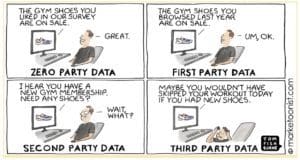Can you spot mediocre marketing… and people?
Over-relying on common sense is a recipe for mediocrity. And what happens to almost ALL mediocre people and companies in a downturn? They lose.
That’s the definition and consequence of a downturn: the average person/company performs below average.
Now, don’t get me wrong:
1. conventional wisdom and common sense have their place – it’s just that booms and busts are not “normal” times and most of those “regular” and old rules don’t apply.
2. if you’ve lost a job/money/savings in a downturn as I have (more than once), it doesn’t make you mediocre.
3. “mediocrity” is not a snapshot of anyone’s current state, it’s a mindset/attitude… and it leaves clues.
Who is mediocre then? I define it like this:
⁃ they seldom take risks
⁃ they follow the market/guru/their competitor with little thought/questioning
⁃ they pay way too much attention to circumstances and external factors
⁃ they have strong limiting beliefs about their ability to do better than the market
⁃ they are usually pessimists but think that they’re actually “realists”. I know this because when they self-assess, it turns out they have low self-confidence and undervalue both their own potential and possibilities, as well as their teams’.
This goes for individuals as well as for businesses.
What do high-performing companies and people do, when the market dips? No, they don’t mindlessly go all-in and start spending just because everyone has hit the brakes.
Here is what goes on with high performers when times are tough:
⁃ foresight: they’re usually prepared for winter because winter always comes (common sense, right? ☺️ )
⁃ mindset: they understand threats but also know that recessions hold massive opportunities and they want to capitalize on them
⁃ assess: they slow down somewhat, only to gauge the new reality and plan
⁃ deliberate action: they are super deliberate about what they need to be doing not just to survive, but to thrive.
Guess what they end up doing most of the time? They go back to the basics. And they do them more deliberately… and better.
In B2B growth departments and marketing, this specifically means:
1. re-assessing the market: talking to your customers to understand what’s changing
2. understanding new trends: besides customers, what new trends are out there that scare us? What are new opportunities?
3. updating offers, collateral, sales plays: repositioning offers, changing languaging, creating a more empathetic presence
4. setting up experiments to test new things.
It all starts with assessing where you are – and we’ve built a small tool for B2B tech companies to do that: https://lnkd.in/gs7ie5GU
It’s a short assessment that helps you:
⁃ see blindspots in your marketing
⁃ assess what you need to do next
⁃ determine what you need to do next now that the market is shifting
I bet it sounds like common sense, but it isn’t.



